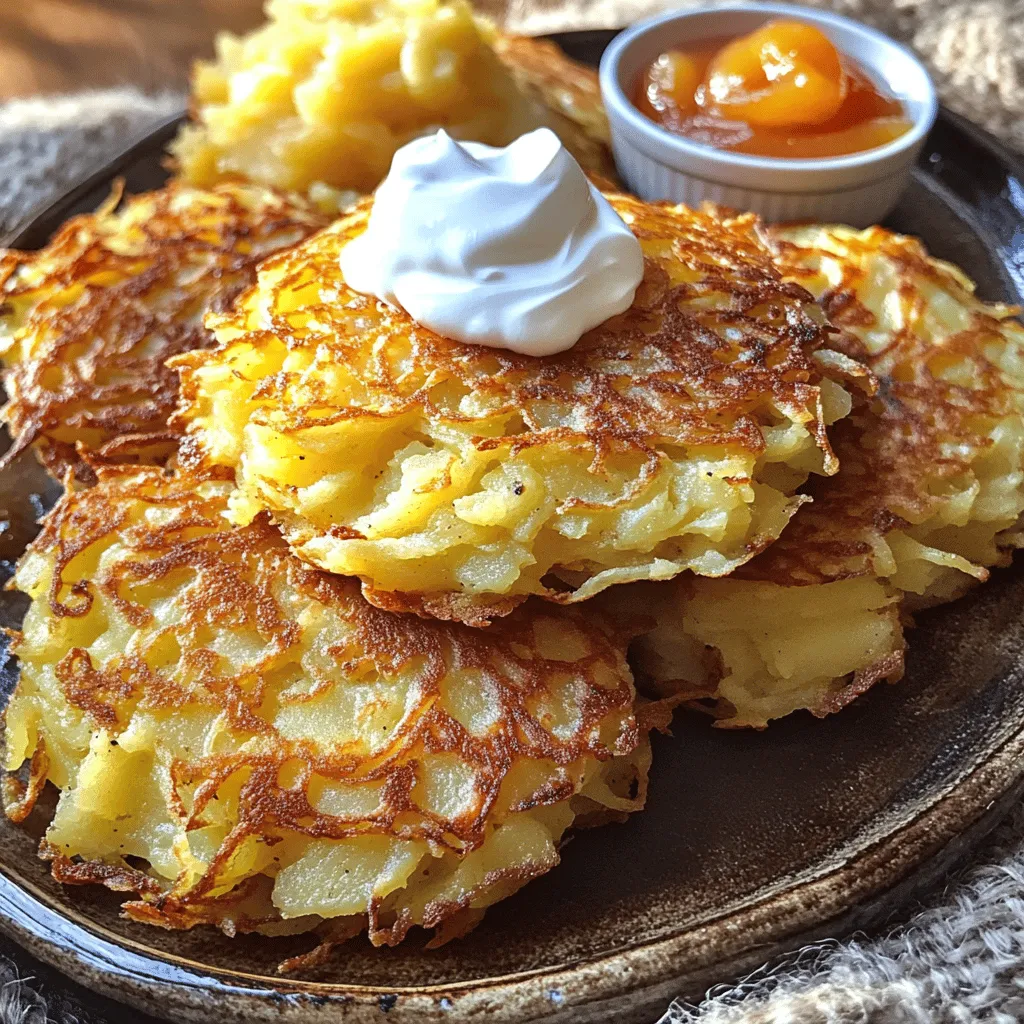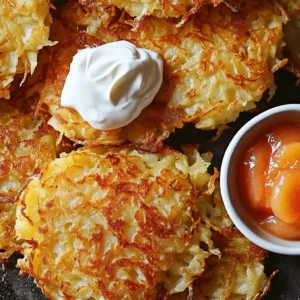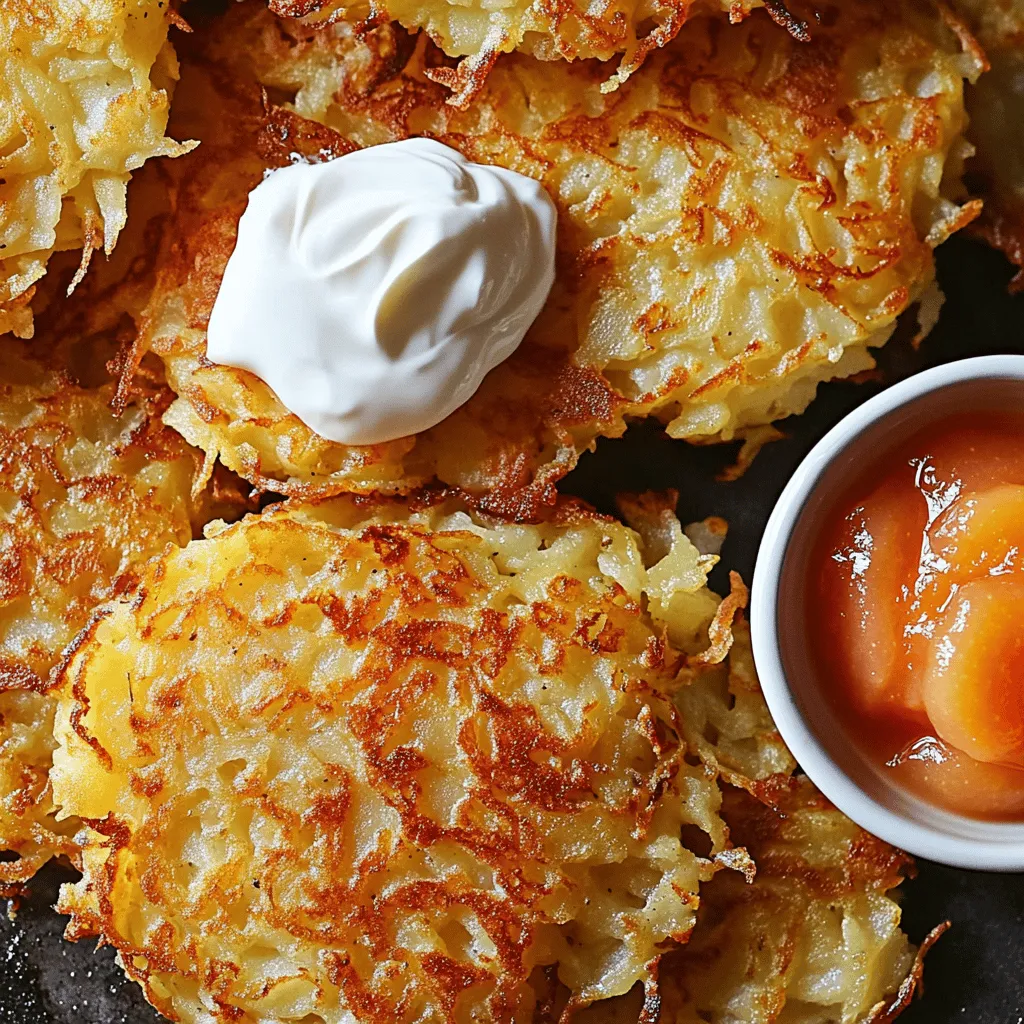Are you ready to dive into a delicious recipe for German potato pancakes? This dish combines simplicity with rich flavors, making it a favorite for any meal. I will guide you through each step, from peeling and grating the perfect potatoes to achieving that crispy texture we all crave. Let’s transform a few key ingredients into a tasty treat that will impress your family and friends. Grab your grater, and let’s get cooking!
Ingredients
Key Ingredients for German Potato Pancakes
– Grated russet potatoes
– Finely grated onion
– Eggs, flour, and baking powder
– Seasonings: salt, pepper, smoked paprika
– Cooking oil and serving suggestions: sour cream and applesauce
To make the best German potato pancakes, you need to start with fresh, high-quality ingredients. The star of the dish is the russet potato. Its starchy texture gives the pancakes that crispy bite we all love.
The onion adds a nice flavor boost. I prefer finely grating it to mix well with the potatoes. The eggs help bind everything together, while the flour and baking powder give the pancakes a light and fluffy texture.
Seasonings play a vital role. Salt and pepper bring out the potato’s natural flavors. Smoked paprika adds a unique twist. It enhances the pancakes’ taste, making them even more delicious.
For cooking, use a good vegetable oil. It helps achieve that crispy outer layer. When serving, I like to pair the pancakes with sour cream and applesauce. These toppings balance the savory and sweet flavors wonderfully.
Check out the Full Recipe for precise quantities and step-by-step guidance to whip up these tasty treats!
Step-by-Step Instructions
Preparation of Ingredients
To make German potato pancakes, start with the potatoes. First, peel the russet potatoes using a vegetable peeler. Then, grate them using a box grater or a food processor. Grating makes the potatoes soft and easy to mix. Once grated, it’s important to remove excess moisture. Place the grated potatoes in a clean kitchen towel and wring it out tightly. Removing moisture is key to getting crispy pancakes.
Mixing the Batter
Now, let’s mix the batter. In a large bowl, combine the grated potatoes with the finely grated onion. Add two large eggs to the mix. Stir until everything is well combined. Next, add the all-purpose flour, baking powder, smoked paprika, salt, and pepper. Mix until you have a cohesive batter. This blend gives the pancakes their unique flavor.
Cooking the Pancakes
Time to cook! Heat a large cast-iron skillet or non-stick pan over medium heat. Pour enough vegetable oil into the pan to coat the bottom well. When the oil is hot, use a measuring cup to scoop about 1/4 cup of the potato mixture. Place it in the skillet and flatten it slightly with a spatula. Repeat this until the pan is full, but don’t overcrowd it. Fry the pancakes for about 3-4 minutes on each side. Look for a golden-brown color and a crispy texture. Add more oil as needed, and transfer cooked pancakes to a paper towel-lined plate to absorb excess oil. Enjoy these crispy delights hot, served with sour cream and applesauce. For the full recipe, check out the details above.
Tips & Tricks
Achieving the Perfect Texture
To get crispy German potato pancakes, focus on moisture. After grating, squeeze the potatoes to remove water. This step is key! Too much moisture leads to soggy pancakes.
Fry at the right temperature. Heat your oil to medium-high. You want it hot enough to sizzle when you add the batter. If the oil is too cool, your pancakes will absorb too much oil.
Flavor Enhancements
Enhance the flavor with spices. Try adding garlic powder or onion powder. Fresh herbs like chives or parsley can brighten the taste. These little tweaks make a big difference!
Consider serving them with different dips. While sour cream and applesauce are classic, try a tangy yogurt or a spicy salsa. These options add a fun twist to your meal.
Kitchen Tools Needed
Use a good pan for frying. A cast-iron skillet works best for even heating. Non-stick pans are also great if you prefer less oil.
For grating, a box grater or food processor saves time. A sturdy mixing bowl is also important for combining your ingredients well. These tools help ensure your pancakes turn out perfectly every time.
For the full recipe, check the section above!

Variations
Ingredient Substitutions
If you want to switch things up, consider these easy swaps for your German potato pancakes.
– Flour Alternatives: You can use almond flour or chickpea flour instead of all-purpose flour. These options add unique flavors and can be gluten-free.
– Egg Substitutes: For a vegan version, try using flaxseed meal mixed with water. This mix binds the ingredients well and keeps the pancakes together.
– Potato Options: While russet potatoes are the classic choice, sweet potatoes or Yukon golds give a different taste and texture. Each type brings its own special flavor.
Regional Twists on the Recipe
Different areas have their own spins on German potato pancakes. Here are some fun ideas.
– Flavor Profiles: You can add garlic, chives, or even cheese to the batter. Each addition changes the taste and makes the pancakes even more exciting.
– Dietary Adaptations: If you need a gluten-free option, just use gluten-free flour. For a vegetarian twist, include veggies like grated zucchini or carrots.
These variations let you enjoy German potato pancakes in many fun ways! For the full recipe, check out the earlier section.
Storage Info
How to Store Leftover Pancakes
To keep your leftover German potato pancakes fresh, follow these steps:
– Refrigerate: Place pancakes in an airtight container. This will help keep them from drying out. Store them in the fridge for up to three days.
– Freeze: For longer storage, freeze the pancakes. Layer them between sheets of parchment paper. Then, place them in a freezer-safe bag or container. They can last up to three months in the freezer.
– Reheat: To heat them up, you can use an oven or a skillet. For the oven, preheat to 375°F (190°C) and bake for about 10-15 minutes. If using a skillet, add a little oil and heat over medium until crispy.
Shelf Life
German potato pancakes have a limited shelf life. When stored in the fridge, they last about three days. If you freeze them, they can last for up to three months. Always check for signs of spoilage, such as off smells or discoloration, before eating.
Using Leftovers in Other Dishes
Don’t let those leftover pancakes go to waste! Here are some fun ways to use them:
– Breakfast Hash: Chop the pancakes into smaller pieces. Sauté with veggies and eggs for a hearty breakfast.
– Soup Topping: Cut them into strips and fry until crispy. Use them as a crunchy topping for soups.
– Pasta Dish: Mix chopped pancakes into pasta dishes for added texture and flavor.
These ideas help you enjoy your leftovers in new and exciting ways!
FAQs
What makes German potato pancakes crispy?
To make German potato pancakes crispy, remove as much moisture as possible from the grated potatoes. Excess moisture leads to soggy pancakes. After grating, use a clean kitchen towel to wring out the water. This step is key. Next, use a hot skillet with enough oil. The oil should be hot enough to sizzle when you add the mixture. This ensures a golden crust forms quickly. Fry the pancakes in small batches, giving them space to cook evenly.
Can I make German potato pancakes ahead of time?
Yes, you can prepare German potato pancakes ahead of time. Cook the pancakes and let them cool fully. Once cool, place them in an airtight container. You can store them in the fridge for up to three days. When you are ready to eat, reheat them in a hot skillet with a bit of oil. This helps restore their crispiness. You can also use an oven to reheat them. Just place them on a baking sheet at 375°F (190°C) for about 10 minutes.
What’s the difference between German potato pancakes and latkes?
German potato pancakes and latkes share similarities but have key differences. Latkes are traditionally made with a finer shred of potato and often use less onion. They may also include matzo meal. German potato pancakes, on the other hand, generally use coarser shreds and more onion. They often have a fluffier texture due to the addition of baking powder. Both are delicious, but each brings unique flavors to the table.
How can I make my potato pancakes healthier?
To make your potato pancakes healthier, you can consider a few options. Start by using less oil for frying. You can use a non-stick pan, which requires less oil. Another option is to bake the pancakes instead of frying them. Use a light spray of oil on a baking sheet and bake at 425°F (220°C) for about 20 minutes, flipping halfway. You can also replace some of the potatoes with grated zucchini or cauliflower for extra veggies.
German potato pancakes offer a crispy, flavorful treat perfect for any meal. You learned about key ingredients like russet potatoes, onions, and seasonings. We covered step-by-step instructions for preparing, mixing, and cooking these pancakes. Helpful tips helped ensure the right texture and flavor. Explore variations for options like gluten-free or vegetarian options. Finally, you can store leftovers easily for future meals. Enjoy making these delicious pancakes and get creative with your own twists!

